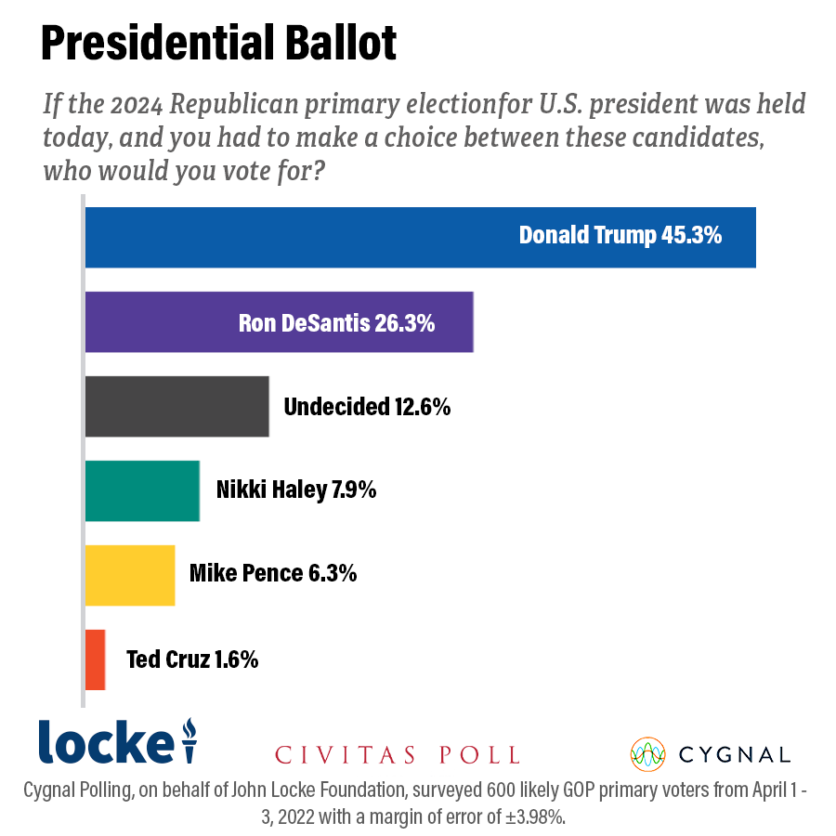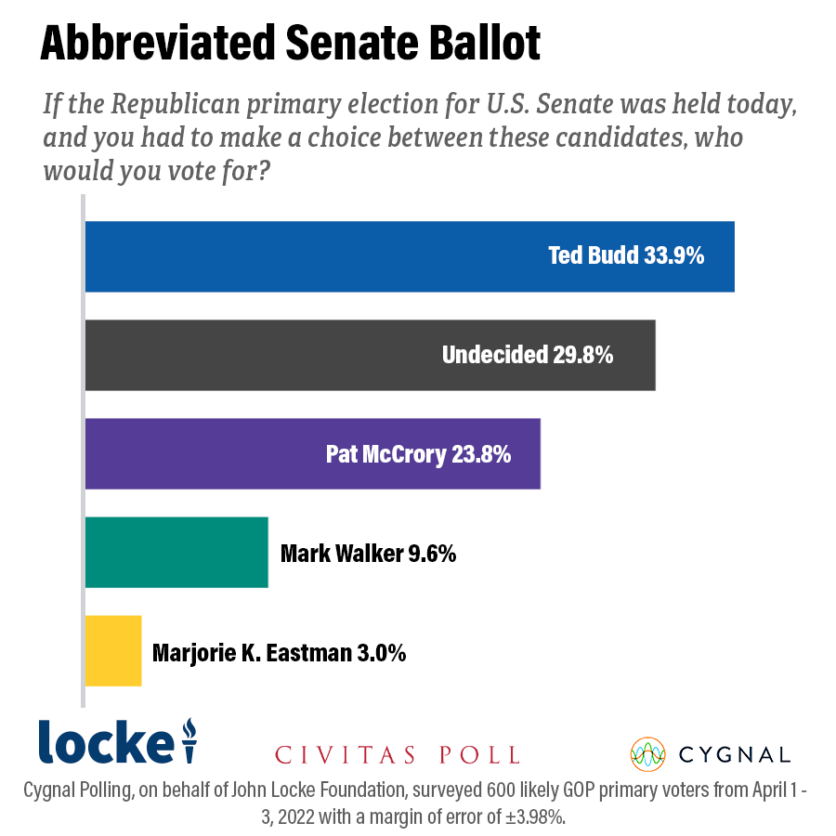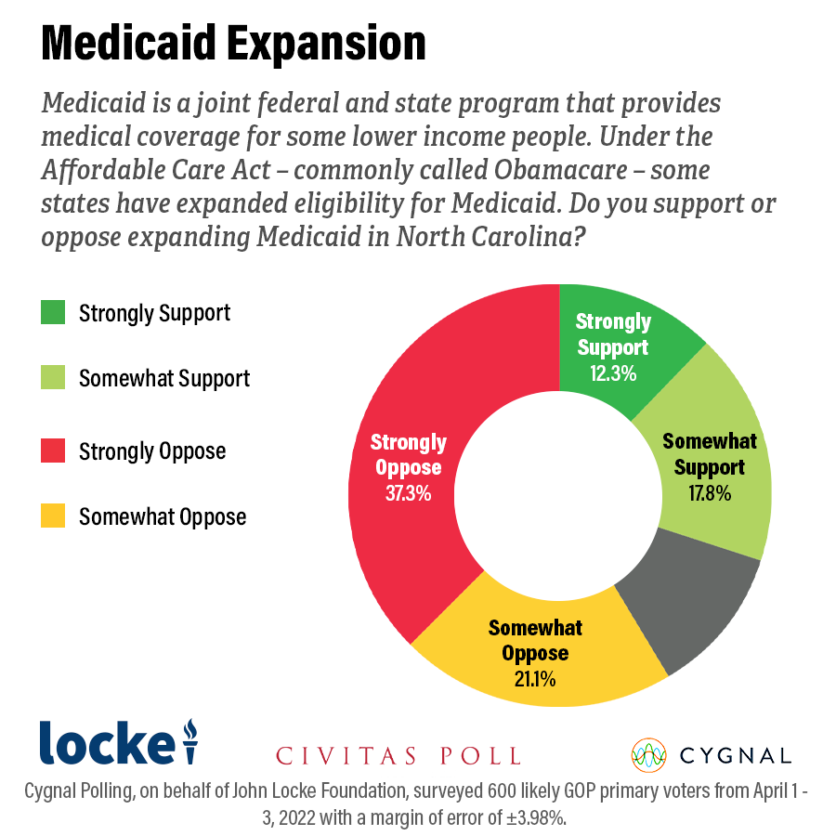April 7, 2022
RALEIGH — U.S. Rep. Ted Budd has taken the lead in the latest Civitas Poll of likely voters in the May 17 Republican primary for North Carolina’s open U.S. Senate seat.
In a competition involving all 14 candidates who will appear on the ballot, Budd has support from nearly 32% of likely primary voters. Former Gov. Pat McCrory comes in second with 21%. Former U.S. Rep. Mark Walker ranks third with 7%. No other candidate tops 1%.
Almost 39% of primary voters remain undecided, less than six weeks away from the primary date. A candidate needs to win more than 30% of the vote to avoid a runoff election.
When the field is narrowed to the four candidates who qualified for a Feb. 26 Carolina Journal debate, Budd secures 34% support compared to 24% for McCrory, 10% for Walker, and 3% for Marjorie Eastman. About 30% of voters remain undecided under that scenario.
“Budd’s nearly 13-point surge since the last time we polled this race, in January, leaps off the topline results. It’s clear that Budd has leaped forward with the $10 million backing of Club for Growth Action in the past few weeks,” said John Locke Foundation President Donald Bryson. “What might be the most remarkable is that we are 40 days out from this election, and nearly 40% of likely primary voters are still undecided.”
Among primary voters identifying themselves as “Trump Republicans,” Budd leads McCrory, 38% to 16%. That’s up from a 24% to 21% margin when a similar poll was conducted in January. McCrory leads Budd, 29% to 23%, among self-described “traditional conservative Republicans.” That margin has dropped since January, when McCrory held a 33% to 12% edge among that group.
Asked for their top two issues in the Senate race, the top response (49%) was securing the border and preventing illegal immigration. Combating inflation and lowering the cost of living came in second (37%), with ensuring election integrity registering third (23%).
Former President Donald Trump has endorsed Budd in the Senate race. More than 55% of likely GOP primary voters said a Trump endorsement would make them more likely to vote for a candidate. About 83% of respondents want a U.S. Senate candidate who is similar to Trump on issues, while 42% want a candidate who mirrors Trump’s “tone” and “style,” along with his issues.
The Civitas Poll finds that 58% of likely Republican primary voters oppose Medicaid expansion. After learning expansion covers mostly healthy, working-age adults with no children, 65% of voters said they would be less likely to support expansion. Some 56% said they would be less likely to support expansion when learning that expansion could not be tied to work requirements due to the Biden administration’s recent moves to overturn the Trump-instituted requirement.
“Medicaid expansion is still an electoral loser for legislative Republicans,” Bryson said. “Aside from expansion being bad policy, it makes incumbents vulnerable to primary challengers and is unlikely to create new Republican voters in a general election.”
More than 82% of respondents remain undecided in the other statewide race on the Republican primary ballot: the three-way contest for a seat on the N.C. Supreme Court. Trey Allen registers 9.5% support, with April Wood securing 6.5%, and Victoria Prince seeing less than 2%.
If the 2024 presidential primary election were held today, 45% of respondents would select Trump in a matchup with four other potential candidates. Florida Gov. Ron DeSantis comes in second (26%), with Nikki Haley (8%), Mike Pence (6%), and Ted Cruz (2%) rounding out the field. Some 13% of GOP primary voters are undecided given those five options.
Among the state’s highest-ranking Republican officials, Lt. Gov. Mark Robinson achieves the best favorability scores. More than 53% have a favorable opinion of Robinson, with just 6% offering an unfavorable opinion. U.S. Sen. Thom Tillis approaches 49% favorability, with 38% registering an unfavorable opinion.
About 91% of likely GOP primary voters believe the United States is on the wrong track, compared to just 7% who say the country is moving in the right direction. More than 60% say “no” when asked whether they believe this year’s general elections will be “free and fair.”
Methodology: This probabilistic survey was conducted by Cygnal, on behalf of the John Locke Foundation, April 1– 3 with 600 likely North Carolina Republican primary election voters. It has a margin of error of ±3.98%. Known registered voters were interviewed via live phones and SMS. This survey was weighted to a likely Republican primary election voter universe.


